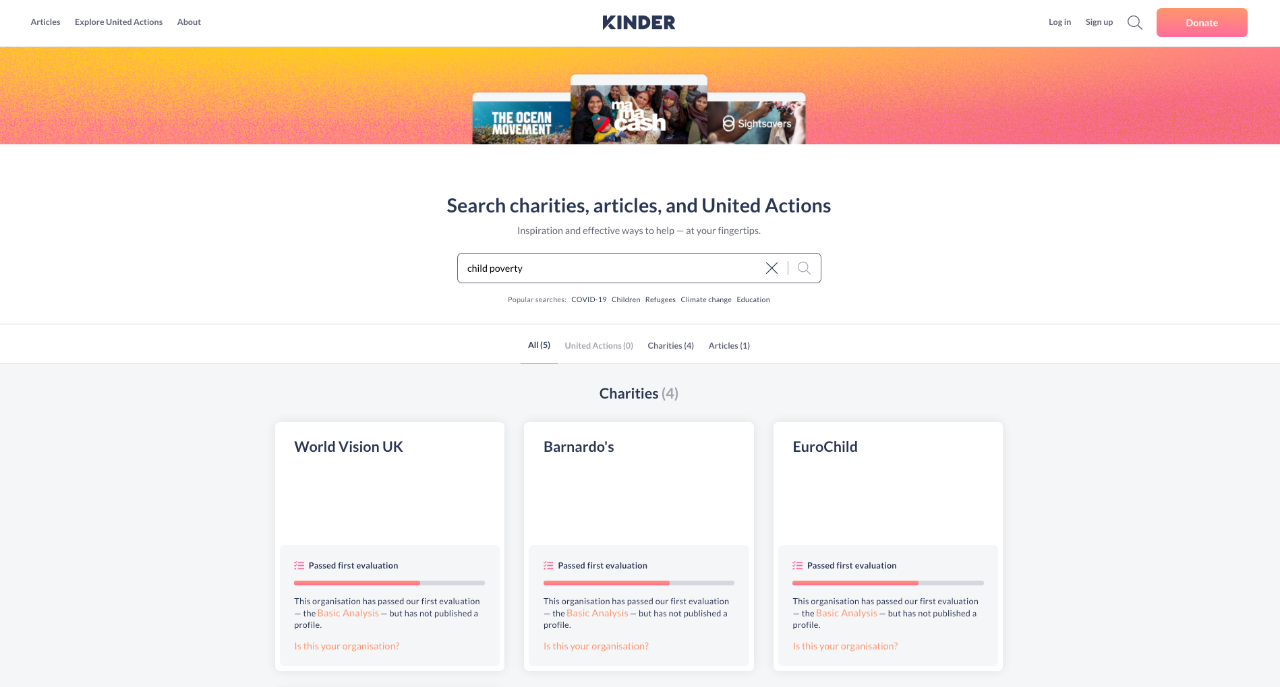By labeling organisations in the results with cards like ‘Did not pass first evaluation’, we’ll be offering the same transparency we encourage in charities. Demonstrating transparency, accessibility, and reliability is a requirement to receive donations on the Kinder platform.
With these new search results, donors can regain confidence in their donations, and nonprofits can improve their benchmarks over time. To date, 40% of nonprofits have met the Basic Analysis criteria and are enjoying increased visibility and trust on the platform.

Why make the Basic Analysis results visible?
In the spirit of transparency — one of our key focus areas when evaluating charities — we have decided to show donors the results of our first evaluations. Our goal is to give donors all the facts they could possibly need to make an informed donation; and restore their confidence in the charity sector.
There are thousands of charities out there doing worthwhile impact work, many of whom we have already evaluated (2500+ and counting). We want to shine a light on the people and initiatives making a difference.
For young organisations, developing sustainable interventions requires a lot of resources. We’re here to help: we see our evaluations as partnerships, giving nonprofits all the information they need to improve their effectiveness. This way, they have the tools to receive the donations they need to do good, better.

Some background on the Basic Analysis
Kinder has teamed up with researchers from Universities of Nevada, Radboud, Maastricht and the Open University Netherlands to develop a framework for evaluating charitable organisations.
This evaluation has three phases: the first of which is the Basic Analysis. In this first phase we ask questions on transparency, accessibility, and reliability— as well as the information charitable organisations share with the public.
We then present the results to organisations in an easily digestible way, so they don’t have to deal with cumbersome reports. In short, it’s a bit like having an audit for free. By helping organisations identify key areas of improvement; they can focus on what is important to them— and the people or problems they are trying to help.
What happens after charitable organisations pass the Basic Analysis?
In the next phase, organisations go through the In-depth Analysis.
The Kinder research team studies the charities that have gone through this second evaluation framework, and provides tailored guidance based on their results.
This includes feedback on how we think they can improve their organisational skills— so they can become more effective and accountable. Concerns about effectiveness and trustworthiness is one of the main reasons for donor hesitancy: we’re here to help with that.
All charities evaluated by Kinder get several resources when they access the Charity Zone: including management of their profile, analysis results, and tailored advice.
We are currently working on a third phase which focuses on impact measurement, which will be available for free for partners on the site. Watch this space!
Contact us
- Want to write about Kinder? Reach out here
- Are you a nonprofit who wants to join the platform? Reach out here
- Do you have questions about your evaluation? Reach out here




